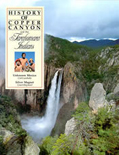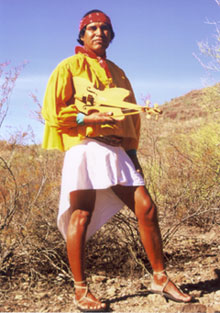|
|
Patracinio
Lopez, Tarahumara Village Leader and Master Carving Artist
As a young goat herder he loved to play the chabarecke which he has described as a two string instrument on a wide stick. At about twelve years of age Patracinio's life changed dramatically when his father dies suddenly. While the extended family helped to care for his brothers and sisters, Patracinio personally wanted to help his mother survive the hard years following his father's death. The decisions he made then changed his life, the life of his family and, indeed the history of his village. Patracinio, just a skinny, underfed Tarahumara boy from the mountains, went down the trail from LaBufa to Batopilas to hire out as a porter for cargo loads to be transported into town. He made less than a dollar a day carrying loads more than 80 pounds during a period of almost a decade. These early years taught him to deal with the outside world, and these skills have served him and his entire village well. Throughout these years his love for music and his traditional Tarahumara celebrations grew. Patracinio came to know Americans for the first time in a very unique way. When the road from LaBufa to Batopilas was finished, many Tarahumaras lost their "jobs", as porters were no longer needed. With the road completed, motor vehicles replaced the traditional Tarahumara carriers. Richard D. Fisher was driving a four wheel drive vehicle with a small group of tourists into Bataopilas when he saw a lone Indian standing by the road at dusk. It looked like perhaps this Tarahumar might need a ride, so one was offered. This chance meeting between two young men of very different cultures was to have a profound effect on hundreds and perhaps thousands of people in Mexico, the United States, and now into Europe. Patracinio has traveled to the USA over ten times as leader of the racing team and as the organizer of the Tarahumara traveling dance and cultural group. From 1991 to 2003, together Fisher and Lopez have been responsible for delivering over 150 tons of grain to the Tarahumara people during the ten year drought. The violin pictured here was handcrafted by Patracinio Lopez. A subsistence farmer, growing primarily corn, beans and squash, he makes violins in his spare time so he can buy the food he cannot grow plus buy essential items that he cannot make, such as matches, candles, thread and clothing. Patracinio's violins are noted both for their workmanship and their heads carved in the shapes of birds and animals. He has won the national violin making championship in Creel six years in a row. Each spring he and Richard D. Fisher sponsor a traditional dance group in the USA where his violins are featured and much sought after. Patracinio lives with his wife, seven young daughters and a young son, Ricardo, in a two room house constructed of a combination of loosely fashioned materials - mostly hand-hewn timbers, adobe and stone, with a wood shake roof. Water is brought to the outside of the house by a small black plastic pipe which comes from a spring located a few hundred yards above the house. The closest road, electricity, or anything that would suggest an even semi-modern world, is a good half-day hike away. In April 2002, Patracinio has been invited to Italy to attend one of the world's leading schools of violin making. This event is historical for all Tarahumara people, and is the result of inborn talent, many years of hard work, and dedication to excellence in all aspects of his endeavors. Unfortunately, due to lack of support he was unable to attend the school. Perhaps with proper sponsorship he can fulfill his invitation in the future. In the last year of the millennium, Patracinio has said that there are still many village members who do not speak or understand Spanish and do not "know or understand anything of the modern world". Patracinio is very happy that he has chosen the door into the modern world, but he is committed to bring tons of grain to his people, with his friend Richard D. Fisher and others. This will provide the possibility for the survival of those who choose a traditional life in the age of globalization. Patracinio Lopez can be contacted c/o Richard D. Fisher, P.O. Box 86492, Tucson, AZ 85754, (520) 882-5341, sunracer@theriver.com. Copyright © 2000 by Canyons Worldwide Website designed and hosted by DigitalTeamworks.com This site looks best when your desktop Screen Area
is set Send comments to: webmaster |







 Patracinio
Lopez was born in a tiny village in the Batopilas Canyon in 1964.
the month and day were not recorded, as is common with most traditional
Tarahumara. He and his childhood friends grew up in traditional Native
American families. Almost as soon as he could walk, Patracinio helped
plant corn and beans.
Patracinio
Lopez was born in a tiny village in the Batopilas Canyon in 1964.
the month and day were not recorded, as is common with most traditional
Tarahumara. He and his childhood friends grew up in traditional Native
American families. Almost as soon as he could walk, Patracinio helped
plant corn and beans.